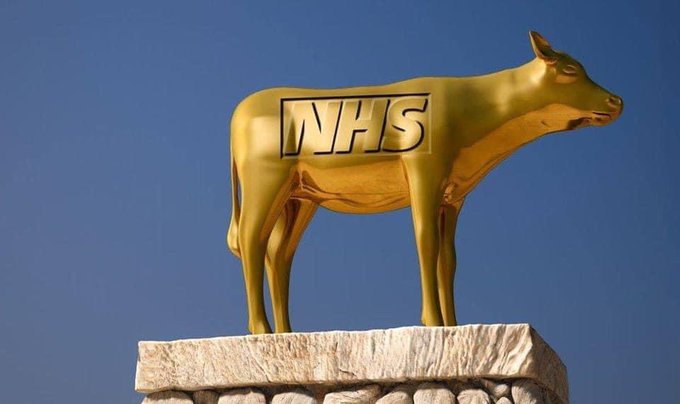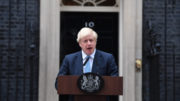A letter has gone out from the NHS’s clinical director to hospitals suggesting methods that could be employed top keep the NHS running. The fact that this letter has gone out and what is in it may say more about the creaking and dysfunctional nature of the NHS model than the threat posed by Omicron. The original text is in italics whereas my comments are in plain text.
- The NHS has ordered hospitals to free up as many beds as possible, which could include discharging fit patients to hotels to wait for social care support to be put in place. Typically, patients are left in hospital while care packages are arranged;
That would be the social care support that already overstretched, badly managed and in some cases and in some areas virtually non-existent would it?
- Leaders have also been ordered to make “full use of non-acute beds in the local health and care system” including the use of beds in hospices and private hospitals;
This would be a great idea if there was not already pressure on hospices and if the NHS had not succumbed to the fetish for centralisation and closed down many of the Cottage Hospitals in favour of massive Soviet style general hospitals. Cottage Hospitals once performed the vital role of being a stepping stone between acute hospitals and discharge to home but few of these are left now. In order to provide a similar service to the one that the NHS trashed, the NHS is now having to buy in expensive private hospital facilities.
- They have also been told to expand the use of “virtual wards”;
To roughly translate this based on how I’ve seen and heard of it working in the past this basically means dumping any burdens onto already overstressed carers and leaving them with a phone app.
- Hospital bosses have been asked to “surge test”, including testing oxygen supplies, and “learn the lessons from previous waves of COVID-19, and making preparations to have the capacity in place to meet a potentially similar challenge this winter”;
This sounds suspiciously like an admission that many Covid infections have been the result of poor infection control including contamination of the oxygen supply system. BTW the NHS fails every winter. You’d think wouldn’t you that such great big brains who are in charge of the NHS would realise that winter comes every year.
- Trusts have been ordered to maintain mental health, learning disability and autism services;
Translation: These services will continue to be as crap, poorly resourced and hard to access for those who need them as they normally are.
- Meanwhile, they have been told to prioritise pre-planned care for “highest clinical priority patients” – which includes those with cancer and those who have been waiting the longest;
This is is a common sense decision and one I’m surprised about after all in recent years we’ve not seen a massive amount of common sense coming from NHS management, hordes of worthless diversity guff yes but little in the way of common sense. To not take this decision would be yet more piss poor optics for an increasingly piss poor service.
- The letter says that services should be maintained “as much as possible”, but recognises that some staff may need to be redeployed to support vaccination efforts;
Bang goes any thoughts of being able to see your GP and woe betide you if you have a nagging and worrying pain or something similar. My vaccination nurse was an ophthalmic nurse which probably meant that someone else got their cataract operation delayed or cancelled.
- Plans to employ more staff should be accelerated – including asking international nurses to come to work in the UK sooner where possible.
Maybe making nursing a degree level profession wasn’t the good idea that some thought it was at the time? It increases the length of time that it takes to train a nurse meaning that the NHS has to rely on overseas staff.
As a nation and as of 2016/2017, according to the Nuffield Trust, the NHS absorbed 7.25% of the nation’s gross domestic product. That’s a lot of money. The amount that the NHS gets from the taxpayer has probably increased due to the pandemic but even in non pandemic times the NHS is a money pit and sadly one that fails to properly manage healthcare or even provide the correct healthcare to those who pay for it and provide it in a timely manner.
What we have in the United Kingdom is not so much a nation with a healthcare system attached but a healthcare system with a nation attached. Successive waves of politicians have turned the NHS into some form of secular religion which all must worship, a situation that has helped to prevent debate about what Britons want from their heath services, how they should be provided and who should provide them.
For many the pandemic has exposed a lot of the faults of the health service and even though I admit that there may well be good people working within it, they can’t do their jobs properly in such a badly managed organisation. Everyone in Britain deserves affordable, timely and high quality healthcare but the false god of the NHS can’t do that and it’s time for change.
The NHS was a good idea when it was originally thought up in the 1930’s and when it was implemented in 1948, but it is a model that is now very much past its prime. Maybe it is time to let back into Britain’s healthcare systems the idea that a comprehensive healthcare system does not mean a monopoly suppliers? Maybe also should be considered the possibility that healthcare services and the property related to them should be returned to the municipal, charitable, religious and similar organisations that they were stolen from in 1948.
Over the years there has been a lot of public support for the NHS but I believe that this mostly comes from people appreciating that they get their healthcare free at the point of use. It’s a major selling point for people to compare the NHS with the US system of mostly private healthcare and to realise that under the NHS they will not go bankrupt due to medical bills should they fall ill. However the pandemic has exposed the failings of the NHS model and I wonder how long people can cling onto a failing NHS healthcare system solely because it is free at the point of use? We might soon be seeing more people like myself speaking up, people who realise that we could still have healthcare that was free at the point of use but which is not afflicted by the many failings of the NHS model.






In the case of my only stay as an in patient, I was kept in for a week because I was having twice daily injections of antibiotics. I actually asked if it could be arranged for me to attend my local surgery or cottage hospital as an outpatient and the nurse said that she would look into it, nothing happened. After the last injection first thing in the morning it took the entire day to get me discharged. I couldn’t just leave as I had to wait until various bits of paperwork and stuff relating to prescriptions and things had been sorted. If this kind of colossal waste is endemic, which I suspect it is, how many beds could be freed up by getting it sorted?
The cottage hospital system, which were often leftovers from pre NHS days and which were set up with charity money, has been decimated by the NHS and its fetish for centralisation. I completely agree with you that the paperwork and similar burdens do contribute greatly to NHS waste.
I’m still trying to work out the multiple ways healthcare was funded before the introduction of the NHS in 1948.
There was both private practice, and hospitals apparently enntirely funded by charities. But we were part of two World Wars in the UK, hospitals had to expand massively to treat wounded military who did not actually die on the battlefield but could return to the UK for treatments and rehabilitation. Also hospitals for the victims of air raids, more significant in WW2.
Was there some public funding to support military hospitals for instance, or was it all voluntary?
I really don’t know, but the factors that possibly led to the arrival of the NHS might he an interesting topic for further research.
Whilst you are absolutely correct that during WWII there was an expansion of state control of medical care, something that was I believe justified because of the scale of the emergency, in general there was a mixed economy in healthcare. Yes there was private medicine that didn’t always provide a good service for the poor but there were also medical services run by local authorities, charities and religious groups. There is a reason why the Royal Free Hospital is named as such because it provided free care for those who needed it and who could not afford private care. Also local people and people in specific trades such as dockworkers in East London sponsored beds at hospitals such as East Ham Memorial Hospital and in the current acute hospital in the area you can still see the plaques documenting these sponsorships. Religious groups such as Jews also built and maintained hospitals for their community although they were not as far as I can make out exclusive to that community but were built in areas where there were a lot of Jews. Other religious groups such as the Mission to Seamen also built a hospital in East London.
*be
*entirely. Blog responses don’t have an edit facility for typos? 🙁